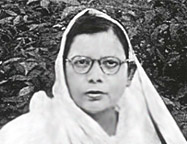 Mahadevi Verma is one of the top ranking figures in the world of Hindi literature. She is always remembered with reverence along with the pioneers of the "Chhayavad" movement, such as Jai Shankar Prasad, Surya Kant Tripathi, `Nirala` and Sumi-tra Nandan Pant. Her style was such that she could easily integrate mysticism of nature with the highest imagination of a human being where sorrow and happiness are interwoven. She has not only enriched Hindi literature but also had given it a new direction, directing it towards newer objectives leading to a more enjoyable and rejoicing path. Her readers were not only impressed by her flowery language and beautiful expression but also in the deep aesthetic stream of philosophical realization of eternal truth emerging from a sense of union with the Supreme Reality, which enabled her readers to have a taste of eternal happiness or bliss.
Mahadevi Verma is one of the top ranking figures in the world of Hindi literature. She is always remembered with reverence along with the pioneers of the "Chhayavad" movement, such as Jai Shankar Prasad, Surya Kant Tripathi, `Nirala` and Sumi-tra Nandan Pant. Her style was such that she could easily integrate mysticism of nature with the highest imagination of a human being where sorrow and happiness are interwoven. She has not only enriched Hindi literature but also had given it a new direction, directing it towards newer objectives leading to a more enjoyable and rejoicing path. Her readers were not only impressed by her flowery language and beautiful expression but also in the deep aesthetic stream of philosophical realization of eternal truth emerging from a sense of union with the Supreme Reality, which enabled her readers to have a taste of eternal happiness or bliss.
She is a renowned poet and scholar. In most of her works we can see the essence of spirituality. She was a lover of nature like Wordsworth. For her the beauty of nature was not only a thing of joy, but also an object of worship and adoration. Nature, for her was an eternal source of inspiration leading to self-realization. She believed that, only by educating women, society becomes enlightened. She wanted women to be empowered and become self-dependent.
Mahadevi Verma`s important works include Deep Shikha, Niharika, Nirja, Rashmi, Yama, Sandhya Geet, Sam-riti Ki Rekhayen and Atit Ke Chalchitra. To her, prose was a subject of the intellect and poetry dealt with emotions. In prose, one needs subjects to ponder over and discuss, but poetry flows by itself. It does not need any sort of external support. She enriched Hindi literature by expressing herself beautifully both in prose and poetry. She was also deeply involved in fine arts, culture and self-expression through her poems, arti-cles and other writings.
She had no interest in politics but she was very much aware of the contemporary scenario. She was against the evils existing in the society in the form of corruption, bribe, treachery, untruth falsehood and hypocrisy. She was a profounder of truth and was a faithful admirer and disciple of Mahatma Gandhi. She said, "At the time of Mahabharata only one untruth brought a lot of misfortune for both Pandavas and Kauravas, but now everyone was taking shelter under untruth, falsehood and hypocrisy. Hence, we find everywhere in society deep distress, unhappiness and misery. Only God knows what will happen to the country." In her presidential address at Hindi Sansthan, Luc-know, she expressed her anguish over the ways the politi-cians who were selfish and self-centered they always gave importance for their well-being and ignored the common well-being of the people. According to her, politicians have become mere puppets in the hands of the dishonest tyrants and their only objective was to achieve the highest seat in the corridors of power. She said," I can understand if some one dreams to serve the country and devote himself for the important task of nation building or to serve mankind at large, but I cannot understand how a person can dream to be at the helm of affairs by snatching the highest chair in the power-achieving game and still think that he is a great person."
Mahadevi closely followed Mahatma Gandhi`s philosophy of life. She worked with towering personalities like Pandit Jawaharlal Nehru and Dr. Rajendra Prasad.
She realized that truth and happiness flows naturally from sacrifice, from reunion with the Supreme Reality. She practiced what she preached in her life. So much so that each and every word in her poems became more or less a sermon, or a piece of scripture.



















